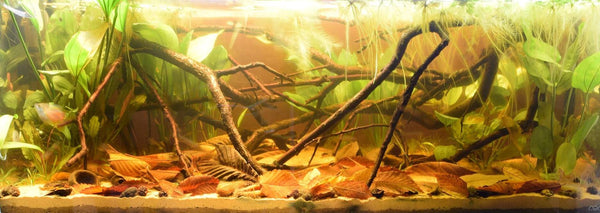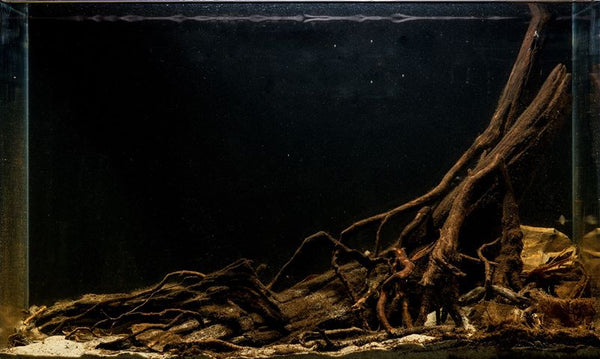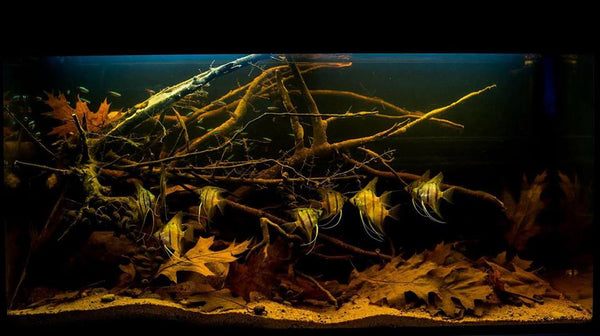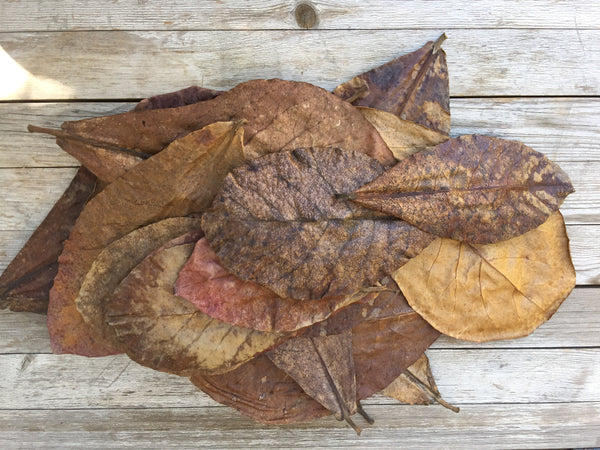- Continue Shopping
- Your Cart is Empty
Key indicators of a "mental shift", and a manifesto for you- the bold adventurers of the aquarium hobby
If you've been following Tannin for a while (like a year and a half now!), you realize that we've been spending a lot of time and effort not only building our brand and offerings, but working towards creating a "mental shift" in the larger aquarium hobby towards the perception of blackwater/botanical-style aquariums.
We think it's happening!
Since we've been in existence, many of you have participated in this global, ever-growing shift towards a more unique style of aquarium, and have brought enthusiasm, creativity, and open-mindedness to the party! It's been pretty gratifying to watch blackwater aquariums, once relegated to the shadowy "oddball" category, moving towards a more rightful place as a legitimate alternative to what's been pushed on us for almost two decades as a "natural style" aquarium.

One of the interesting things that we've noticed is how "technique" or "best practices" in our little niche has evolved. With more and more aquarists entering into the fray, and sharing their aquariums and ideas, we've seen a thriving community of "tinters" sharing their ideas, questioning long-held beliefs, and generally pushing through mental barriers that were erected years before by hobbyists who likely never even attempted to keep such an aquarium.

Okay, enough pats on the back.
Here's a very cool observation for you that shows just how far we've come as a group: The question was posed on social media about the use of leaves and botanicals; specifically wether or not you remove or leave in leaves and botanicals as they start to break down in your aquariums. Just a couple of years ago, even posing such a question would be almost heretical, with instant criticism and large amounts of unsubstantiated yet absolutely close-minded assertions that leaving leaves and botanicals in the aquarium to fully decompose would seriously compromise water quality. (and, this doesn't even take into account the fact that the idea of even adding such things to your aquarium in the first place would be questioned a couple of years back)

The overwhelming majority of hobbyists who responded indicated that they "leave 'em in" their aquariums to be fully broken down. This is astonishing to us; a tangible and significant example of the "mental shift" that hobbyists have made regarding these aquariums. Rather than simply accepting "doctrine", we've begun to examine for ourselves what the real impact of these materials is on our systems.
It's now understood among botanical/blackwater enthusiasts that, in an otherwise well-maintained aquarium, with attention paid to standard husbandry practices and monitoring the environment, that there is typically little significant impact on overall water quality. It's understood that the botanicals are acted upon by beneficial microbial life, and serve as a supplemental food source or foraging substrate for a variety of life forms, ranging from crustaceans to snails, and on up to Plecos and such. Like so many things in the aquarium world, it's not as cut and dry as simply operating on the assumption that anything left to break down in the aquarium is always detrimental to the health of the system.
Now, for every success story, there are always a few hobbyists who have had contradictory experiences. We've occasionally heard from people who've seen nitrate rising, or algae blooms, or whatever, attributed to the decomposing botanical materials in their aquariums. On the surface, hearing these cases, you'd be tempted to question the whole idea of leaving materials in, but there are a lot of factors and variables that can contribute to the less desirable outcomes that some have had. They need to at least be considered. For example, the bioload of the system before botanicals were added, the husbandry practices utilized, the length of time that the aquarium has been established, etc., etc. All are important considerations that could have significant impact on the results.

And, as we've asserted many times, botanical-style blackwater aquariums are not "set and forget" systems. Like any aquarium that attempts to maintain a stable environment that embraces parameters which differ from our "tap water" conditions, these aquariums require keen observation, attention to detail, and regular proactive maintenance. Lower general hardness/ pH systems have unique considerations that not everyone has experience working with.
It's an evolving art form, and as more and more hobbyists of varying experience levels work with these systems, what was previously considered sketchy, "fringe" stuff will simply become accepted methodology for maintaining proper conditions. However, there is a price to be paid by those who tempt the "status quo." My hatred of pessimism and dismissiveness in our hobby compels me to draw a parallel with events from the past of the aquarium hobby.
We saw this in the mid 1980's with reef aquariums. The prevailing technique and application of technology at the time made the idea of keeping corals, invertebrates and the associated "live rock/live sand" a very questionable, "out there" practice. It was long thought that most corals would simply not thrive in aquariums, because we couldn't maintain the necessary water quality over time to sustain their health. Rather than simply accept the prevailing thinking and dismiss the idea outright, open-minded hobbyists looked at the issues and challenges, and figured out ways to utilize technique and tweak existing technology (and develop some new stuff) to provide the proper conditions to help reef animals thrive in captivity.

The rest is history, and even novice hobbyists are keeping reef aquariums in their homes with live coral that in decades past were considered nearly impossible to keep alive, let alone propagate. By creating "best practices" and sharing what worked and what was really required, the pioneering reef hobbyists helped evolve the reef aquarium segment of the hobby out from the fringes and into the mainstream.

Now, I hold no illusions that blackwater aquariums, with their tinted water, biofilms, decomposing leaves, and totally different aesthetic, will ever achieve the magnitude of prominence in the aquarium hobby that reef tanks have achieved. However, with more and more being understood about the benefits of humic substances for fishes and greater importance being ascribed to providing more natural conditions for our fishes, I think we'll see a lot more acceptance, and various parts of our "practices" will be assimilated into "mainstream" hobby technique.
As bold adventurers who have decided not to simply fold and accept the assertions of regurgitating naysayers, or of those who failed previously, you're doing exactly what is necessary to advance the state of the freshwater hobby. By looking beyond the superficial aspects of these long-held assertions, and simply putting in the work and doing- you're contributing to a greater understanding of an important methodology for long-term maintenance of our treasured aquarium fishes.

With natural environments, such as the peat swamps of Southeast Asia, and the tributaries of the Rio Negro, under increasing pressure from human activities, it's more important than ever to develop techniques to successfully keep and spawn the fishes from these threatened habitats. Not only will it create a better understanding of the habitats themselves, but unlocking the secrets of the care of the fishes which come from them will help reduce the need to collect them from the wild. These are extremely important issues and goals, which "everyday aquarists" like you and me can make significant contributions towards achieving.

By boldly working towards understanding these unique environments and how to recreate them in the aquarium, you are an active participant in a incalculably valuable effort that will positively impact our planet for generations.

Yeah, it's that real.
So the next time someone tells you that "you can't", rather than simply accept it, challenge back: "Maybe YOU can't. I'm going to try and learn." Look at the results you're getting from what you're actually doing-good and bad- and learn from them; share them, and tweak as necessary. "Rinse and repeat."

Of course, don't be arrogant or elitist, but move forward knowing what is really in play here, and how making the "mental shift" to question and move past artificial barriers and long-held beliefs based on incomplete data can free you from previous limitations. Share what you do with integrity and grace.

There will be failures. Mistakes. Dark days. Seemingly unfair criticisms from fellow hobbyists. "I told you so" moments. However, there will also be learning. Incremental developments, steady progress, and genuine breakthroughs.
There's no turning back now.
Turn into the wind. You've already embarked on the journey.
Stay bold. Stay committed. Stay open-minded. Stay honest.
And Stay Wet.
Scott Fellman
Tannin Aquatics













Scott Fellman
Author